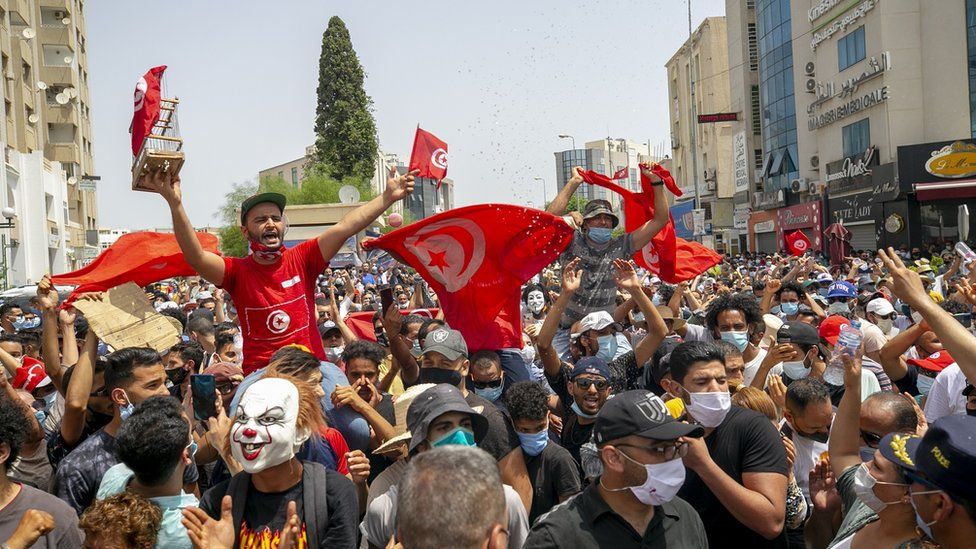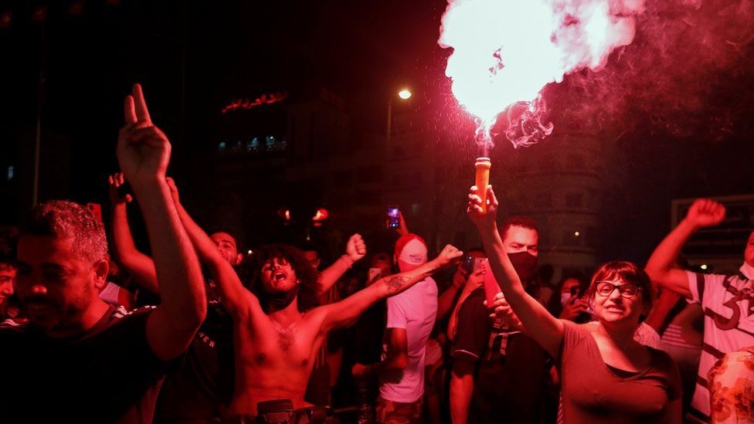Tunisia's president has sacked the prime minister and suspended parliament, after violent mass protests nationwide on Sunday.
Anger over the government's handling of a massive recent spike in Covid cases has added to general unrest over the nation's economic and social turmoil.
President Kais Saied, who was elected in 2019, announced he was taking over.
His supporters erupted in celebration, but opponents in parliament immediately accused him of staging a coup.
Tunisia's revolution in 2011 is often held up as the sole success of the Arab Spring revolts across the region, but it has not led to stability economically or politically.
The recent coronavirus surge - which saw the health minister sacked last week after a bungled vaccination operation - has fuelled long-standing frustration.
Sunday saw thousands of people demonstrating against Prime Minister Hichem Mechichi and the moderate Islamist ruling party, Ennahda, shouting "Get out!".
One protester, Lamia Meftahi, told Reuters news agency that this was "the happiest moment since the revolution".
Security forces in the capital, Tunis, blocked off parliament and streets around the central Avenue Bourguiba.
Protesters also stormed Ennahda offices, smashing computers and setting fire to its local headquarters in Touzeur.
In a televised address, Mr Saied said: "We have taken these decisions... until social peace returns to Tunisia and until we save the state."

He later joined the celebrating crowds in Tunis.
President Saied also vowed to respond to further violence with military force.
"I warn any who think of resorting to weapons… and whoever shoots a bullet, the armed forces will respond with bullets," he said.
Coup accusations
In Tunisia, both the president and parliament are elected in popular votes.
Under the constitution, the president oversees only the military and foreign affairs, but Mr Saied, an independent, has long been in conflict with Mr Mechichi.
Mr Saied has said he will now govern alongside a new PM, with parliament suspended for 30 days.
The president cited Article 80 of the constitution for his actions, saying it allowed him to suspend parliament if it was in "imminent danger".
But Tunisia's legal and political framework is unclear. The 2014 constitution calls for a special court to be set up to decide disputes like this, but it has not been established.
Tunisian Parliament Speaker Rached Ghannouchi accused the president of mounting "a coup against the revolution and constitution".
"We consider the institutions to be still standing and supporters of Ennahda and the Tunisian people will defend the revolution," Mr Ghannouchi, Ennahda's leader, said.
Two other parties, Heart of Tunisia and Karama, echoed the coup accusations.
Ennahda denounced attacks on its offices, blaming "criminal gangs" who were trying to "seed chaos and destruction".
Latest Stories
-
I was 20 when I played for Ghana’s U-17 team – Charles Taylor
2 hours -
Journalist Fentuo Tahiru Fentuo launches Tumu Community Cup set for May 24
2 hours -
Joseph Taylor breaks Ghana’s 29-Year 400m national record with sub-45s run
2 hours -
Greater Accra public lands: Government to set up Commission of Inquiry
3 hours -
Cleanliness to be used for measuring performance of MMDCEs – Mahama
3 hours -
You are now a beacon of hope – Nungua Mantse to President Mahama
3 hours -
‘Smart formalisation’ holds the answer to Africa’s problems – Bawumia
3 hours -
President Mahama assures chiefs and people of Greater Accra of good roads
3 hours -
Mahama announces plans to upgrade Greater Accra Regional Hospital to Teaching Hospital
3 hours -
‘Stop boasting amidst debt’ – Walewale MP chides government
3 hours -
Walewale MP accuses John Jinapor of dubious procurement amid energy sector concerns
3 hours -
Toobu urges humane and collaborative approach to tackling street begging
4 hours -
26-year-old cleaner jailed 36 months for stealing $5k
4 hours -
Herdsman in police custody over cattle theft
4 hours -
Vivo Energy holds annual retail conference and awards
4 hours

